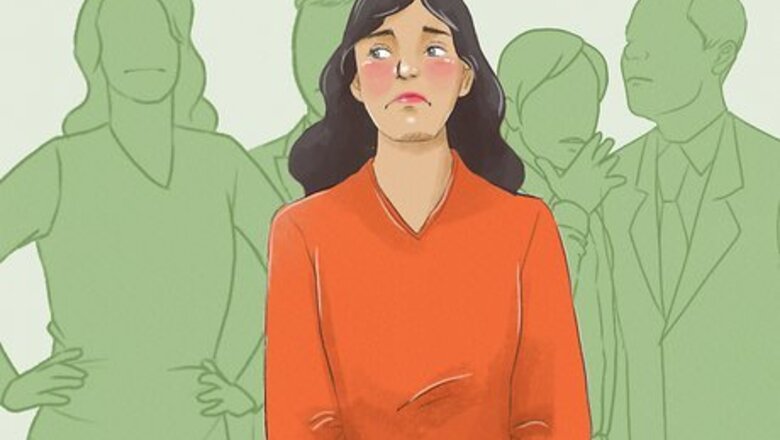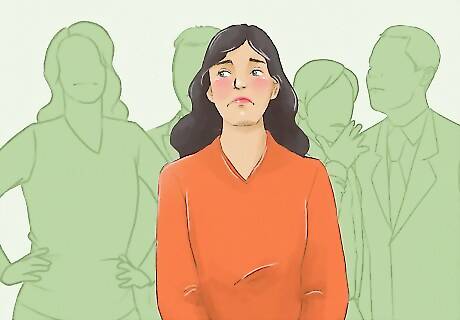
views
You’re outside your comfort zone.

Feeling fake can sometimes be a sign of growth. When we push ourselves to be in a space outside of our comfort zone, we often find it hard to be our natural selves. But this actually can be a good thing: being outside of our comfort zone is how we become more capable and stronger people. For example, you might feel out of your comfort zone when you’re at a big party, or when you’re doing a presentation at work. As a result, you might end up feeling fake during these occasions. As you continue to place yourself in situations outside of your comfort zone—whether in social settings, school, or work—you’ll find that these feelings of ‘fakeness’ eventually start to disappear. Keep putting yourself out there, and you might be able to feel a greater sense of authenticity.
You’re naturally introverted.

Introverts can find it hard to feel authentic in social settings. If you’re someone who feels burnt out in social settings, and prefer being by yourself to recharge your energy, feeling fake when you’re with others isn’t an uncommon experience. Though these feelings can make you feel uncomfortable, there’s nothing wrong with being an introvert. Many introverts feel less guarded and more authentic in smaller settings, when they’re talking to a close friend one-on-one. If you feel uncomfortable and fake in large groups, it’s okay to center your social life around more intimate settings.
You’re a people-pleaser.

Changing yourself to make others happy can make you feel fake. If you find yourself ready to downplay certain aspects of who you are to make others feel more comfortable, feeling fake can be the result. It’s okay to have people-pleasing tendencies, and it’s also okay to choose to always be your full self. If you want to reduce your people-pleasing tendencies, start by learning how to say no to small things. For example, if a friend is pushing you into going to a party that you’d rather not, say something like, “I appreciate the offer, but I’ll pass. I’d rather spend the night in, but we’ll catch up sometime soon.”
You’re living a passive lifestyle.

Solitary activities like watching TV make people feel less authentic. Studies have shown that people generally feel most true to themselves when they’re going out and living a more active lifestyle. Explore the world, meet new people, and try out new activities and experiences—by being in these environments, you’ll feel more authentic and in-touch with yourself. Activities like spending time in nature, going to concerts or museums, or caring for others can make you feel more true to yourself.
You’re under a lot of social pressure.

It can be tough meeting others expectations while being yourself. Cultural and societal obligations can put a lot of pressure on you to act in a certain way, one that might not match up to who you really are. For example, if you’re from a relatively traditional culture, you might find that your desire to live a more unique lifestyle meets a lot of negative pushback. This can cause you to feel fake more often than you’d like. On the other hand, some studies have shown that we actually feel most authentic when we conform to the expectations of others. So, even people who hate dinner parties feel most authentic when acting like sociable guests. Try to spend more time with people who’ve been with you through good times and bad. Finding a group of friends who you trust to love you no matter who you are can give you a space to be your authentic self.
You’re struggling with low self-esteem.

Thinking you’re fake could mean you’re being hard on yourself. If you’re someone who constantly criticizes yourself, calling yourself fake might be part of the package. Dealing with low self-esteem is hard, and you should try improving it by recognizing your strengths, capabilities, and uniqueness. The most important step you can take to improve your self-esteem is to challenge your negative thought patterns. When you find yourself thinking cruel things about yourself, like “Why am I such a fake person?” take a step back. Then, substitute these thoughts for something more positive, like “I’m an adaptable and strong person.”
You’re too focused on being authentic.

Being authentic might not be as important as you think. In the end, there might not be such a thing as your “work self” or “school self” that is different from who you really are. All of us are complex people with many layers, and we don’t have to be ashamed of this. Try to make peace with the fact that like any person, you change who you are depending on the circumstances. This can be a sign of strength, not weakness. If you’re finding yourself trapped in thoughts about ‘feeling fake,’ find a healthy distraction. Head to the movie theater, take a walk, or cook yourself a nice meal. This will give you something else to focus on.
You feel like you don’t deserve your accomplishments.

Imposter syndrome is common among high-achievers, so look out for it. Doubting your qualifications when you’re in a space full of ambitious and high-achieving people, either at work or school, isn’t unusual. But remember that sometimes we can’t see all of our own strengths, even when they’re apparent to others. Stop imposter syndrome in its tracks by being kinder to yourself. By focusing on your work instead of whether you deserve to be in your position, you can keep yourself on the track to success.
You’re a perfectionist.

Perfectionists punish themselves for failing to live up to their standards. Because these standards are unreasonably high, this can lead to a lot of self-doubt, including feeling like you’re a fake. But it’s important to remember that everyone makes mistakes, and no one can actually be perfect—failing to achieve the standards that you’ve set for yourself isn’t a sign that you’re a bad person. If you’re dealing with perfectionist tendencies, work on forgiving yourself. Don’t torture yourself when you make a mistake. Instead, repeat an internal mantra, like “There’s no need to be perfect—good is enough.”
You’re responding to past trauma.

Trauma can change the way we interact with others. For example, if you’ve been emotionally hurt in the past, you might find yourself withdrawing from others even when you want to be close to them. This disconnect between your actions and desires is an outcome of trauma, and can lead you to feel inauthentic and fake. Working with a therapist to understand the origins of your trauma and come up with ways to overcome it can really help you. Many therapists practice Cognitive Behavioral Therapy, which has been scientifically proven to help manage your trauma by giving you strategies to manage your emotional responses.
You’re dealing with depression.

Depression is a serious condition that can cause you to doubt yourself. People struggling with depression often feel unable to show their true self to the world, and as a result, deal with feeling inauthentic on a regular basis. Recovering from depression can help you feel more authentic and engaged in your daily life and the world at large. Most people with depression will need treatment to recover. This treatment can include therapy, medication, or a combination of the two. Don’t hesitate to seek help by scheduling an appointment with a mental health professional.
You’re experiencing derealization.

Derealization can have you feeling like an observer to your own life. Derealization involves feeling disassociated from your surroundings, and is often a response to a history of trauma or abuse. Some people who experience derealization describe it as feeling as though they’re floating above their body, but you might experience it differently. Seeking help for this condition can have you feeling more authentic in your daily life. Depersonalization is a similar feeling of disassociation to derealization. While derealization involves feeling like things around you are unreal, depersonalization is the experience of feeling that you yourself are not real. Brief episodes of derealization are common. About half of all people describe occasionally feeling like they’re watching themselves in a movie. These episodes don’t normally need treatment unless they become too frequent. Psychotherapy has been shown to help control episodes of derealization and depersonalization. By working with a therapist, especially one trained in psychodynamic therapy, you can find ways to limit the number of times you feel disassociated from yourself.




















Comments
0 comment